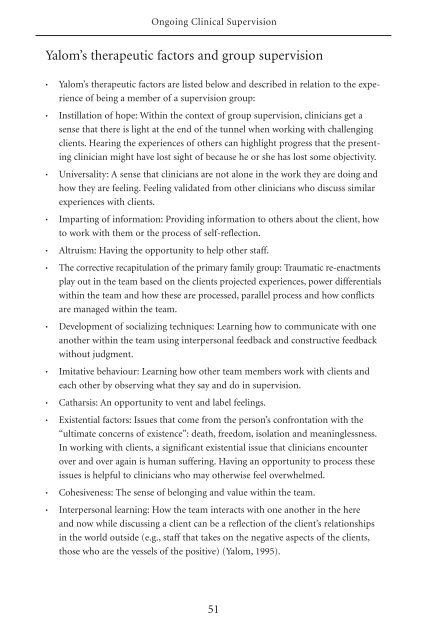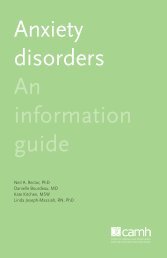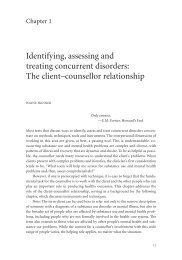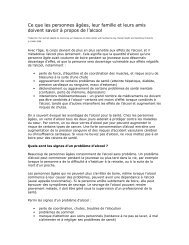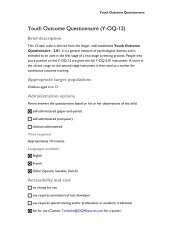Clinical Supervision Handbook - CAMH Knowledge Exchange ...
Clinical Supervision Handbook - CAMH Knowledge Exchange ...
Clinical Supervision Handbook - CAMH Knowledge Exchange ...
Create successful ePaper yourself
Turn your PDF publications into a flip-book with our unique Google optimized e-Paper software.
Ongoing <strong>Clinical</strong> <strong>Supervision</strong><br />
Yalom’s therapeutic factors and group supervision<br />
• Yalom’s therapeutic factors are listed below and described in relation to the experience<br />
of being a member of a supervision group:<br />
• Instillation of hope: Within the context of group supervision, clinicians get a<br />
sense that there is light at the end of the tunnel when working with challenging<br />
clients. Hearing the experiences of others can highlight progress that the presenting<br />
clinician might have lost sight of because he or she has lost some objectivity.<br />
• Universality: A sense that clinicians are not alone in the work they are doing and<br />
how they are feeling. Feeling validated from other clinicians who discuss similar<br />
experiences with clients.<br />
• Imparting of information: Providing information to others about the client, how<br />
to work with them or the process of self-reflection.<br />
• Altruism: Having the opportunity to help other staff.<br />
• The corrective recapitulation of the primary family group: Traumatic re-enactments<br />
play out in the team based on the clients projected experiences, power differentials<br />
within the team and how these are processed, parallel process and how conflicts<br />
are managed within the team.<br />
• Development of socializing techniques: Learning how to communicate with one<br />
another within the team using interpersonal feedback and constructive feedback<br />
without judgment.<br />
• Imitative behaviour: Learning how other team members work with clients and<br />
each other by observing what they say and do in supervision.<br />
• Catharsis: An opportunity to vent and label feelings.<br />
• Existential factors: Issues that come from the person’s confrontation with the<br />
“ultimate concerns of existence”: death, freedom, isolation and meaninglessness.<br />
In working with clients, a significant existential issue that clinicians encounter<br />
over and over again is human suffering. Having an opportunity to process these<br />
issues is helpful to clinicians who may otherwise feel overwhelmed.<br />
• Cohesiveness: The sense of belonging and value within the team.<br />
• Interpersonal learning: How the team interacts with one another in the here<br />
and now while discussing a client can be a reflection of the client’s relationships<br />
in the world outside (e.g., staff that takes on the negative aspects of the clients,<br />
those who are the vessels of the positive) (Yalom, 1995).<br />
51


